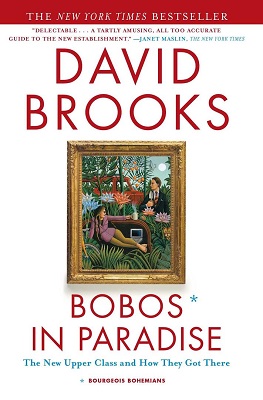Bobos' Paradise Lost?
By Arnold Kling

For one reason or another the following people and institutions fall outside the ranks of Bobo respectability: Donald Trump, Pat Robertson, Louis Farrakhan, Bob Guccione, Wayne Newton, Nancy Reagan, Adnan Khashoggi, Jesse Helms, Jerry Springer, Mike Tyson, Rush Limbaugh, Philip Morris, developers, loggers, Hallmark greeting cards, the National Rifle Association, Hooters.
—David Brooks, Bobos in Paradise: The New Upper Class and How They Got There1 (pages 47-48)
The 2016 U.S. Presidential election revolved around the social class that David Brooks nearly twenty years ago dubbed Bobos, short for bourgeois bohemians. Donald Trump’s victory struck me as the triumph of an individual as well as an entire class scorned by the Bobos. This motivates one to revisit Brooks’s classic in order to see what Brooks understood then and what he might have missed about the contemporary elite.
Brooks saw the American cultural scene as having discarded, at the end of the 1960s, the elitism of the WASPs (white Anglo-Saxon Protestants) that was dominant through the middle of the twentieth century. After a few decades of turmoil, a new elite had emerged.
Today [the book appeared in 2000], America once again has a dominant class that defines the parameters of respectable opinion and taste—a class that determines conventional wisdom, that promulgates a code of good manners, that establishes a pecking order to give shape to society, that excludes those who violate its codes, that transmits its moral and etiquette codes to its children, that imposes social discipline on the rest of society so as to improve its “quality of life,” to use the contemporary phrase. (page 46)
The mid-century elites were formed in industries that produced automobiles, steel, oil, and other tangible outputs. The Bobos instead tend to be found in modern industries that involve intangible abstractions, including entertainment, finance, and computer software.
In terms of social communication, the abstract-oriented Bobos have a tremendous advantage over people who work in agriculture, mining, manufacturing, construction, and other industries that deal in concrete products. This led Brooks to devote a long chapter to their intellectual life. He cites sociologist Pierre Bourdieu:
Ultimately, Bourdieu writes, intellectuals compete to gain a monopoly over the power to consecrate. Certain people and institutions at the top of each specialty have the power to confer prestige and honor on favored individuals, subjects, and style of discourse. [They] influence taste, favor certain methodologies, and define the boundaries of their disciplines. To be chief consecrator is the intellectual’s dream. (page 151)
I am reminded of macroeconomist Stanley Fischer, who fit the role “chief consecrator” when he taught at MIT in the late 1970s and 1980s. His students went on to fill not only an inordinate number of prestigious academic positions but also powerful roles at the Council of Economic Advisers, the International Monetary Fund, the Federal Reserve Board, and central banks in other countries. But the macroeconomic ideas of Fischer and his disciples could be viewed by someone outside their orbit as at best flawed and at worst downright silly.2
Brooks offers a description of a moderate intellectual.
While a radical intellectual must be vehement, contentious, and unhappy, moderate intellectuals must be civil, slow-talking, and placid. Moderates appeal to consumers who are basically happy with the world… (page 160)
Brooks himself fits the description of the moderate intellectual. But it seems to me that since the book appeared, his type has been in decline. As the Internet has taken over our culture, the competition for the attention of the audience has become more intense. This apparently gives the advantage to commentators who display the radical temperament, who in Brooks’s words “must say or do things his opponents hate.” (page 159)
For more on these topics, see “MIT’s Model Economics Department,” by Arnold Kling, Library of Economics and Liberty, June 1, 2015. See also He Is No Gentleman, by Pedro Schwartz, Library of Economics and Liberty, April 3, 2017.
Brooks describes the Bobos as Baby Boomers who experienced the 1960s and have arrived at a synthesis of the opposing cultural factions of that era. They retain the hippie outlook in their preference for organic foods and hostility toward fossil fuels, but their dedication to work and family would make someone from the 1950s proud.
Brooks diagnosed the way in which the Bobos backed away from the individualism and thirst for novelty of the 1960s as well as from the economic deregulation ethos of the 1980s. Whereas earlier rebels celebrated freedom’s opportunities, the Bobos fear its risks:
… the two crucial words in the Bobo political project these days… are community and control. (page 261)
According to Brooks, this accounts for a variety of phenomena, from helicopter parenting to colleges imposing new rules about sexual conduct, to restrictions on development in urban areas, to support for economic regulation.
What Brooks might have foreseen, but did not, was how this Bobo project would play out as it gathered momentum. In the last two decades, we have witnessed the acceleration of the long-term trend toward expansion of the more abstract-oriented industries, such as finance and entertainment, and a decline of the more concrete-oriented industries, such as manufacturing and mining. As a result, the cultural influence of Bobos has soared. The Bobos became insistently cosmopolitan on issues of immigration and foreign relations, increasingly aggressive in their assault on traditional ideas about gender, and increasingly eager to stifle the speech on campus of those with whom they disagree.
“What few people noticed until last year’s election was that resentment was building against the Bobos’ cultural hegemony.”
What few people noticed until last year’s election was that resentment was building against the Bobos’ cultural hegemony. Brooks certainly did not see it coming when he wrote,
And in truth it is hard to see how the rule of the meritocrats could ever come to an end. The WASP establishment fell pretty easily in the 1960s. It surrendered almost without a shot. But the meritocratic Bobo class is rich with the spirit of self-criticism. It is flexible and amorphous enough to co-opt that which it does not already command. The Bobo meritocracy will not easily be toppled, even if some group of people were to rise up and conclude that it should be. (page 53)
Yet the Bobos were rudely ousted by Mr. Trump.
Looking ahead, one can only speculate on how this will play out. Perhaps last year’s election will prove to be a fluke, the Bobos’ cultural steamroller will get moving again, and the Trump movement will be crushed. Or perhaps the Bobos will prove to be “flexible and amorphous enough to co-opt” Trump supporters in a way that makes the latter feel better while allowing the Bobos to direct economic activity, gender relations, climate policy, and so forth.
But from a libertarian perspective, I try to imagine a more unlikely scenario. That is, I hope that the Bobos become less convinced of the merit of directing others’ lives to conform more closely to Bobo tastes and instead become tolerant of individual choice and risk-taking.
David Brooks, Bobos in Paradise: The New Upper Class and How They Got There. Simon & Schuster, 2001.
*Arnold Kling has a Ph.D. in economics from the Massachusetts Institute of Technology. He is the author of several books, including Crisis of Abundance: Rethinking How We Pay for Health Care; Invisible Wealth: The Hidden Story of How Markets Work; Unchecked and Unbalanced: How the Discrepancy Between Knowledge and Power Caused the Financial Crisis and Threatens Democracy; and Specialization and Trade: A Re-introduction to Economics. He contributed to EconLog from January 2003 through August 2012.
For more articles by Arnold Kling, see the Archive.

